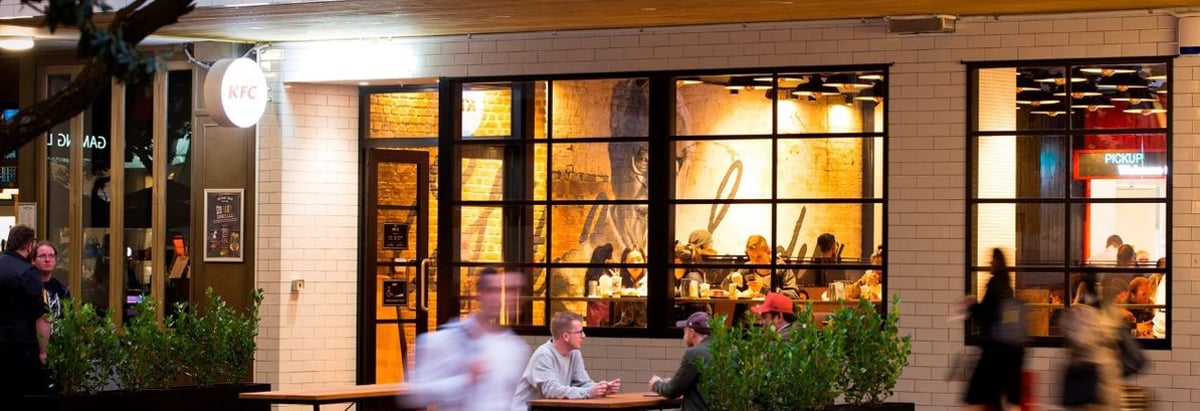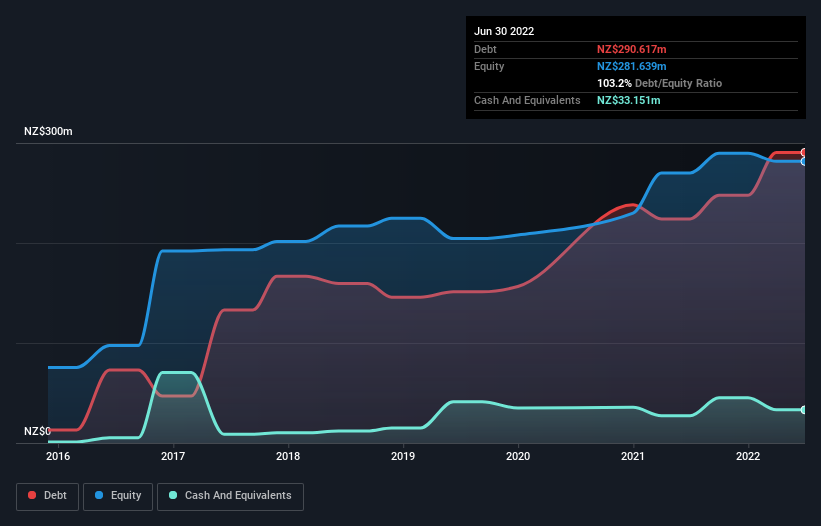- New Zealand
- /
- Hospitality
- /
- NZSE:RBD
Restaurant Brands New Zealand (NZSE:RBD) Has A Somewhat Strained Balance Sheet

Howard Marks put it nicely when he said that, rather than worrying about share price volatility, 'The possibility of permanent loss is the risk I worry about... and every practical investor I know worries about.' When we think about how risky a company is, we always like to look at its use of debt, since debt overload can lead to ruin. As with many other companies Restaurant Brands New Zealand Limited (NZSE:RBD) makes use of debt. But the more important question is: how much risk is that debt creating?
What Risk Does Debt Bring?
Generally speaking, debt only becomes a real problem when a company can't easily pay it off, either by raising capital or with its own cash flow. Part and parcel of capitalism is the process of 'creative destruction' where failed businesses are mercilessly liquidated by their bankers. However, a more common (but still painful) scenario is that it has to raise new equity capital at a low price, thus permanently diluting shareholders. Of course, debt can be an important tool in businesses, particularly capital heavy businesses. When we think about a company's use of debt, we first look at cash and debt together.
View our latest analysis for Restaurant Brands New Zealand
How Much Debt Does Restaurant Brands New Zealand Carry?
As you can see below, at the end of June 2022, Restaurant Brands New Zealand had NZ$290.6m of debt, up from NZ$224.1m a year ago. Click the image for more detail. However, it does have NZ$33.2m in cash offsetting this, leading to net debt of about NZ$257.5m.

How Healthy Is Restaurant Brands New Zealand's Balance Sheet?
According to the last reported balance sheet, Restaurant Brands New Zealand had liabilities of NZ$349.5m due within 12 months, and liabilities of NZ$796.0m due beyond 12 months. On the other hand, it had cash of NZ$33.2m and NZ$26.9m worth of receivables due within a year. So its liabilities outweigh the sum of its cash and (near-term) receivables by NZ$1.09b.
Given this deficit is actually higher than the company's market capitalization of NZ$817.2m, we think shareholders really should watch Restaurant Brands New Zealand's debt levels, like a parent watching their child ride a bike for the first time. In the scenario where the company had to clean up its balance sheet quickly, it seems likely shareholders would suffer extensive dilution.
We use two main ratios to inform us about debt levels relative to earnings. The first is net debt divided by earnings before interest, tax, depreciation, and amortization (EBITDA), while the second is how many times its earnings before interest and tax (EBIT) covers its interest expense (or its interest cover, for short). The advantage of this approach is that we take into account both the absolute quantum of debt (with net debt to EBITDA) and the actual interest expenses associated with that debt (with its interest cover ratio).
While Restaurant Brands New Zealand has a quite reasonable net debt to EBITDA multiple of 2.0, its interest cover seems weak, at 2.0. This does suggest the company is paying fairly high interest rates. In any case, it's safe to say the company has meaningful debt. Shareholders should be aware that Restaurant Brands New Zealand's EBIT was down 24% last year. If that earnings trend continues then paying off its debt will be about as easy as herding cats on to a roller coaster. The balance sheet is clearly the area to focus on when you are analysing debt. But ultimately the future profitability of the business will decide if Restaurant Brands New Zealand can strengthen its balance sheet over time. So if you want to see what the professionals think, you might find this free report on analyst profit forecasts to be interesting.
Finally, while the tax-man may adore accounting profits, lenders only accept cold hard cash. So we clearly need to look at whether that EBIT is leading to corresponding free cash flow. During the last three years, Restaurant Brands New Zealand produced sturdy free cash flow equating to 55% of its EBIT, about what we'd expect. This free cash flow puts the company in a good position to pay down debt, when appropriate.
Our View
To be frank both Restaurant Brands New Zealand's interest cover and its track record of (not) growing its EBIT make us rather uncomfortable with its debt levels. But on the bright side, its conversion of EBIT to free cash flow is a good sign, and makes us more optimistic. Overall, it seems to us that Restaurant Brands New Zealand's balance sheet is really quite a risk to the business. For this reason we're pretty cautious about the stock, and we think shareholders should keep a close eye on its liquidity. When analysing debt levels, the balance sheet is the obvious place to start. But ultimately, every company can contain risks that exist outside of the balance sheet. These risks can be hard to spot. Every company has them, and we've spotted 3 warning signs for Restaurant Brands New Zealand (of which 2 shouldn't be ignored!) you should know about.
At the end of the day, it's often better to focus on companies that are free from net debt. You can access our special list of such companies (all with a track record of profit growth). It's free.
New: AI Stock Screener & Alerts
Our new AI Stock Screener scans the market every day to uncover opportunities.
• Dividend Powerhouses (3%+ Yield)
• Undervalued Small Caps with Insider Buying
• High growth Tech and AI Companies
Or build your own from over 50 metrics.
Have feedback on this article? Concerned about the content? Get in touch with us directly. Alternatively, email editorial-team (at) simplywallst.com.
This article by Simply Wall St is general in nature. We provide commentary based on historical data and analyst forecasts only using an unbiased methodology and our articles are not intended to be financial advice. It does not constitute a recommendation to buy or sell any stock, and does not take account of your objectives, or your financial situation. We aim to bring you long-term focused analysis driven by fundamental data. Note that our analysis may not factor in the latest price-sensitive company announcements or qualitative material. Simply Wall St has no position in any stocks mentioned.
About NZSE:RBD
Restaurant Brands New Zealand
Operates quick service and takeaway restaurants in New Zealand, Australia, California, Hawaii, Saipan, and Guam.
Good value with proven track record.


